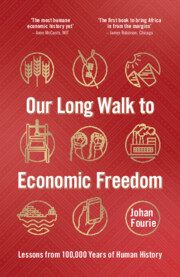Book contents
- Our Long Walk to Economic Freedom
- Our Long Walk to Economic Freedom
- Copyright page
- Dedication
- Contents
- Figures
- Acknowledgements
- A Note on Sources and Terminology
- How Do We Thrive?
- 1 Who Are the Architects of Wakanda?
- 2 What Happened at Blombos in 70,000 BCE?
- 3 Why Are the Danes So Individualistic?
- 4 Why Does isiXhosa Have Clicks?
- 5 How Did Joseph and His Eleven Brothers Solve the Three Economic Problems?
- 6 What Do Charlemagne and King Zwelithini Have in Common?
- 7 Why Do Indians Have Dowry and Africans Lobola?
- 8 Who Was the Richest Man Ever to Live?
- 9 How Did 168 Spanish Conquistadores Capture an Empire?
- 10 Why Was a Giraffe the Perfect Gift for the Chinese Emperor?
- 11 Who Visited Gorée Island on 27 June 2013?
- 12 What Is an Incunabulum?
- 13 Who Was Autshumao’s Niece?
- 14 What Did Thomson, Watson & Co. Purchase?
- 15 What Do an Indonesian Volcano, Frankenstein and Shaka Zulu Have in Common?
- 16 Why Was the Spinning Jenny Not Invented in India?
- 17 Why Did Railways Hurt Basotho Farmers?
- 18 What Did Sol Plaatje Find on His Journey through South Africa?
- 19 Why Can You Have Any Car as Long as It Is Black?
- 20 What Does a Butterfly Collector Do in the Congo?
- 21 Who Wrote the Best Closing Line of Modern Literature?
- 22 How Could a Movie Embarrass Stalin?
- 23 Who Is the Perfect Soldier?
- 24 What Was the Great Leap Forward?
- 25 Why Should We Cry for Argentina?
- 26 Who Was the Last King of Scotland?
- 27 How Did Einstein Help Create Eskom?
- 28 Why Would You Want to Eat Sushi in the Transkei?
- 29 Why Do the Japanese Play Rugby?
- 30 What Do Lego and the Greatest Invention of the Twentieth Century Have in Common?
- 31 What Is Funny about Moore’s Law?
- 32 What Bubbles in Iceland?
- 33 What Did The Economist Get Spectacularly Wrong?
- 34 Will Madiba’s Long Walk to Freedom Ever End?
- 35 What Should No Scholar Ever Do?
- Epilogue
- Notes
- Bibliography
- Index
10 - Why Was a Giraffe the Perfect Gift for the Chinese Emperor?
The Indian Ocean Trade and European Imperialism
Published online by Cambridge University Press: 30 August 2022
- Our Long Walk to Economic Freedom
- Our Long Walk to Economic Freedom
- Copyright page
- Dedication
- Contents
- Figures
- Acknowledgements
- A Note on Sources and Terminology
- How Do We Thrive?
- 1 Who Are the Architects of Wakanda?
- 2 What Happened at Blombos in 70,000 BCE?
- 3 Why Are the Danes So Individualistic?
- 4 Why Does isiXhosa Have Clicks?
- 5 How Did Joseph and His Eleven Brothers Solve the Three Economic Problems?
- 6 What Do Charlemagne and King Zwelithini Have in Common?
- 7 Why Do Indians Have Dowry and Africans Lobola?
- 8 Who Was the Richest Man Ever to Live?
- 9 How Did 168 Spanish Conquistadores Capture an Empire?
- 10 Why Was a Giraffe the Perfect Gift for the Chinese Emperor?
- 11 Who Visited Gorée Island on 27 June 2013?
- 12 What Is an Incunabulum?
- 13 Who Was Autshumao’s Niece?
- 14 What Did Thomson, Watson & Co. Purchase?
- 15 What Do an Indonesian Volcano, Frankenstein and Shaka Zulu Have in Common?
- 16 Why Was the Spinning Jenny Not Invented in India?
- 17 Why Did Railways Hurt Basotho Farmers?
- 18 What Did Sol Plaatje Find on His Journey through South Africa?
- 19 Why Can You Have Any Car as Long as It Is Black?
- 20 What Does a Butterfly Collector Do in the Congo?
- 21 Who Wrote the Best Closing Line of Modern Literature?
- 22 How Could a Movie Embarrass Stalin?
- 23 Who Is the Perfect Soldier?
- 24 What Was the Great Leap Forward?
- 25 Why Should We Cry for Argentina?
- 26 Who Was the Last King of Scotland?
- 27 How Did Einstein Help Create Eskom?
- 28 Why Would You Want to Eat Sushi in the Transkei?
- 29 Why Do the Japanese Play Rugby?
- 30 What Do Lego and the Greatest Invention of the Twentieth Century Have in Common?
- 31 What Is Funny about Moore’s Law?
- 32 What Bubbles in Iceland?
- 33 What Did The Economist Get Spectacularly Wrong?
- 34 Will Madiba’s Long Walk to Freedom Ever End?
- 35 What Should No Scholar Ever Do?
- Epilogue
- Notes
- Bibliography
- Index
Summary
On the east coast of Tanzania, south of Dar es Salaam, lies the tiny island of Kilwa Kisiwani. From the thirteenth to the fifteenth centuries the port city of Kilwa was the centre of trade for the entire Swahili coast, integrated in a trading network that stretched as far as Arabia, India and even China. The inhabitants of this beautiful city were ethnically mixed – including Persians, Arabs and Bantu-speaking Africans – and, over time, they developed a distinctive East African culture and language – Swahili, which literally means ‘coast dwellers’. This cultural influence stretched all along the East African coast, from Inhambane and Sofala in the south (modern-day Mozambique) to Mombasa and Malindi (Kenya) and Mogadishu (Somalia) in the north.
The trade network along the East African coast had ancient roots. Some Chinese records suggest trade connections between Africans and Chinese as far back as the Han dynasty in China (206 BCE–220 CE). But much of our evidence come from archaeologists who have excavated and analysed glass beads in East Africa
- Type
- Chapter
- Information
- Our Long Walk to Economic FreedomLessons from 100,000 Years of Human History, pp. 53 - 57Publisher: Cambridge University PressPrint publication year: 2022

